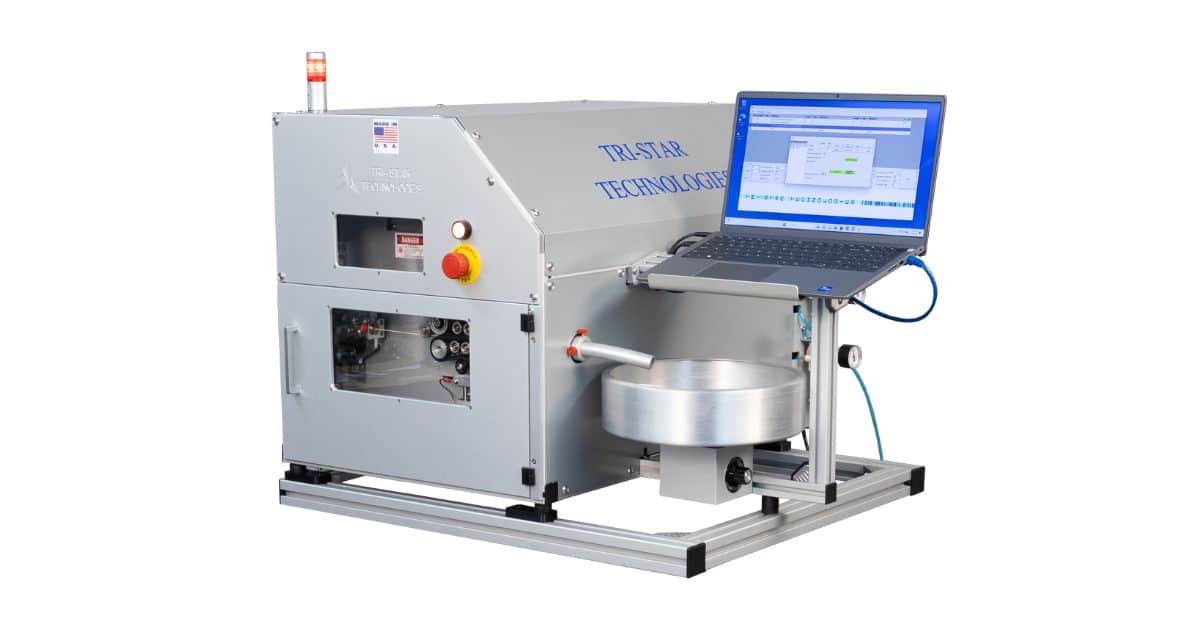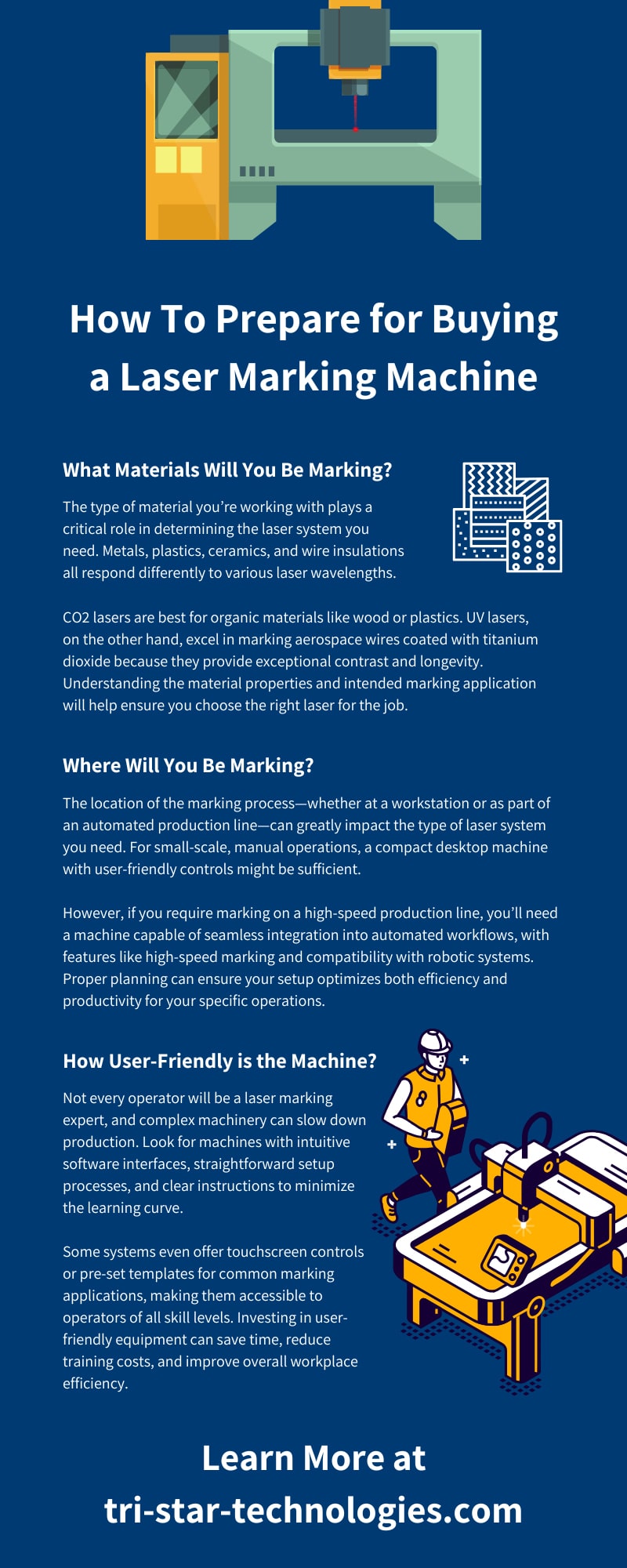How To Prepare for Buying a Laser Marking Machine

Laser marking technology has transformed manufacturing with unmatched precision and reliability. For professionals like manufacturing managers, aerospace engineers, and process improvement specialists, it enhances product traceability and ensures compliance with industry standards. If you’re interested in adding laser marking to your process, we’ll show you how to prepare for buying a laser marking machine and more below.
Understanding Laser Marking Technology
First, let’s review the basics of laser marking technology to better understand if it’s right for your application. Laser marking uses a high-intensity, focused beam of light to create permanent marks on various materials.
Unlike other marking methods—such as inkjet printing or mechanical engraving—laser marking is contact-free, precise, and capable of producing high-resolution markings without damaging the underlying material. This technology stands out for its ability to meet strict industry standards, especially in sectors like aerospace, where part identification and traceability are critical.
A Review of Laser Marking Technology
Laser marking isn’t one-size-fits-all. There are many different versions of laser marking in how it reacts with the material that offers unique advantages, such as:
- Ablation: Removes the surface material to create a mark but may compromise material integrity.
- Color Change: Alters the pigmentation of the material’s surface without damaging it. This is particularly popular in aerospace, as seen in UV laser marking using titanium dioxide-enhanced coatings on wires.
- Annealing: Produces marks via heat without engraving the material, which is best for marking metals.
- Foaming or Melting: Causes localized changes to create a mark, though these may suffer from durability challenges in demanding environments.
Among these, UV laser marking is notable for producing high-contrast, stable markings without causing structural or visual damage—a critical advantage for applications requiring long-term durability.
Why Manufacturers Invest in Laser Marking
Laser marking is more than just a convenient labeling solution; it’s a value-driven investment. There are many reasons manufacturers add laser marking to their processes, from its precision to its eco-friendliness.
Precision and Quality
Laser marking achieves unparalleled accuracy, which is ideal for industries like aerospace, automotive, and medical manufacturing, where even the smallest error can lead to significant risks. It ensures clear, permanent, and highly detailed markings, providing reliability and quality assurance for these high-stakes industries.
Durability and Longevity
Unlike engraving or ink-based markings, laser markings are resistant to wear, fading, and environmental conditions such as extreme heat, UV exposure, and chemicals. This makes laser markings particularly compatible for industries requiring long-lasting and precise identification.
Compliance and Traceability
Meeting stringent industry standards is critical, especially in aerospace and defense. Laser marking ensures compliance with specifications such as AS9120, providing permanent and tamper-proof identification crucial for traceability.
Cost-Effectiveness
While the initial cost of a laser marking machine can be significant, the technology eliminates the need for consumables like inks or labels. It also reduces downtime, minimizes maintenance, and offers a fast return on investment by streamlining operations.
Eco-Friendliness
Many industries are prioritizing sustainability. Laser marking is a green solution, as it involves no chemicals or consumables and generates almost no waste.
Applications for Laser Marking
Laser marking is a versatile solution for many industries, it may be ideal for yours, too. In aerospace, it provides high-contrast identification for wires, cables, and components without affecting material integrity, often utilizing UV laser marking. The automotive sector relies on laser marking for serial numbers, barcodes, and safety information, ensuring better traceability even on complex surfaces.
Electronic manufacturers also benefit from precision laser marking, using it to produce detailed logos, codes, and text on small components while maintaining durability. In the packaging industry, laser technology is widely used to mark date codes, batch numbers, and brand logos, offering both practical functionality and enhanced aesthetics for materials.
Considerations When Purchasing a Laser Marking Machine
Investing in a laser marking machine is not a one-and-done decision. To prepare for buying a laser marking machine, there are many things to consider when finding the ideal system for your application, from the material you’ll be working on to how it’ll integrate into your workflow.
What Materials Will You Be Marking?
The type of material you’re working with plays a critical role in determining the laser system you need. Metals, plastics, ceramics, and wire insulations all respond differently to various laser wavelengths.
CO2 lasers are best for organic materials like wood or plastics. UV lasers, on the other hand, excel in marking aerospace wires coated with titanium dioxide because they provide exceptional contrast and longevity. Understanding the material properties and intended marking application will help ensure you choose the right laser for the job.
Where Will You Be Marking?
The location of the marking process—whether at a workstation or as part of an automated production line—can greatly impact the type of laser system you need. For small-scale, manual operations, a compact desktop machine with user-friendly controls might be sufficient.
However, if you require marking on a high-speed production line, you’ll need a machine capable of seamless integration into automated workflows, with features like high-speed marking and compatibility with robotic systems. Proper planning can ensure your setup optimizes both efficiency and productivity for your specific operations.
How User-Friendly is the Machine?
Not every operator will be a laser marking expert, and complex machinery can slow down production. Look for machines with intuitive software interfaces, straightforward setup processes, and clear instructions to minimize the learning curve.
Some systems even offer touchscreen controls or pre-set templates for common marking applications, making them accessible to operators of all skill levels. Investing in user-friendly equipment can save time, reduce training costs, and improve overall workplace efficiency.
How Will You Integrate the Machine into Your Workflow?
Think about how the laser marking machine will fit into your current workflows and what additional equipment might be necessary to support it. Integrating a laser marker into a production line may require conveyor belts to move parts through the marking station, robotic arms for precise placement, or custom software solutions to communicate with existing systems. Ensure that the laser system you choose is compatible with data tracking or serialization software if traceability or quality control is a priority.
What Demands Does Your Application Require?
Certain industries and applications impose unique demands that your laser system must meet. Aerospace and automotive components, for instance, must comply with strict performance and testing standards, such as those government agencies like NASA and the Department of Defense outline.
This might involve ensuring markings are resistant to extreme temperatures, chemicals, or abrasion. Similarly, medical device manufacturers may need to ensure compliance with FDA regulations for permanent and biocompatible markings. Identifying these requirements early on can help you select a system that meets your current needs and aligns with industry standards.
Find Your Next Laser Marking Machine at Tri-Star Technologies
Choosing the right laser marking machine is crucial to ensure precision, durability, and operational efficiency. As a laser marking machine supplier, Tri-Star Technologies can offer innovative solutions like the M-100L-FG UV Laser Marking system to meet stringent industry standards with unmatched precision.
Our expert staff is also available to answer any questions and help you find the right laser marking system for your application and workflow. Explore our products online or contact us at (310) 347-5767 to discover how our cutting-edge technology can transform your manufacturing processes.



